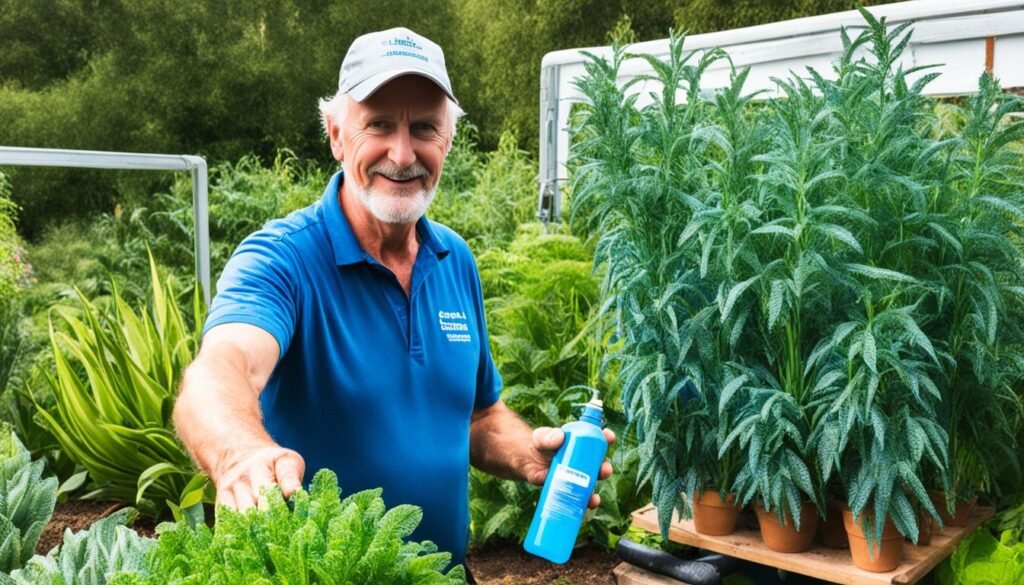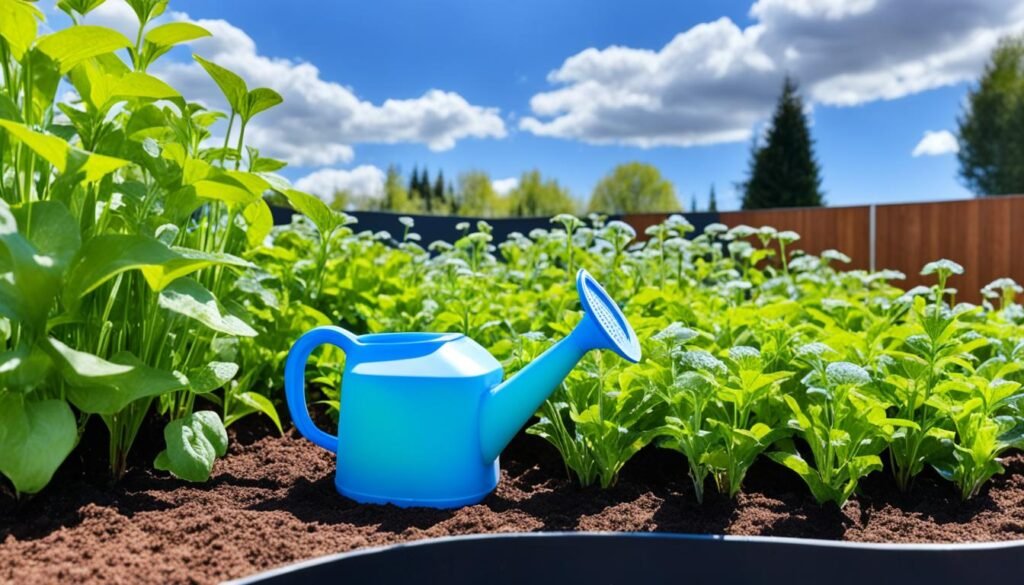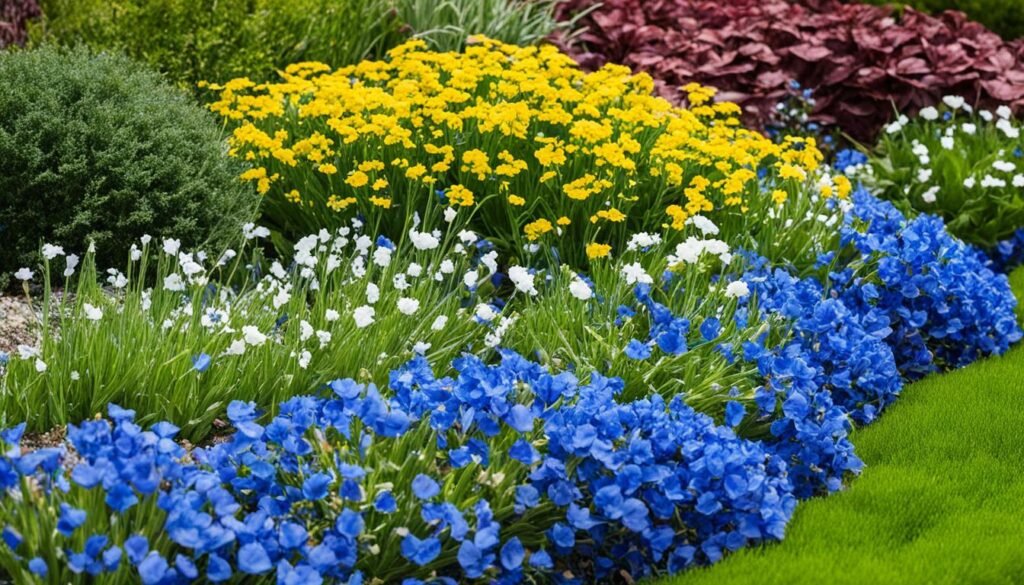Fungal diseases, whilst significant, affect a substantial number of crops globally, leading to notable reductions in agricultural productivity.
As a gardener, protecting your plants is crucial to ensure your garden remains healthy and vibrant. Copper sulphate, a copper-based fungicide, is an invaluable tool for preventing and controlling a variety of fungal and bacterial diseases. – Here’s why it could be considered a secret weapon for maintaining a healthy garden.
What is Copper Sulphate?
Copper sulphate is a type of copper-based fungicide that I frequently use to manage fungal diseases in plants. It comprises copper, a trace mineral that is toxic to a variety of fungi and bacteria. When in contact with these microorganisms, copper sulphate disrupts their metabolism, inhibiting their growth and reproduction.
This fungicide is considered broad-spectrum because it effectively targets a wide range of fungal and bacterial diseases, assisting with the control of blights, spots, mildews, and rusts, among others. The versatility of copper sulphate makes it an indispensable tool for gardeners aiming to safeguard their plants from these detrimental diseases.
If you are curious about how copper sulphate functions, it’s quite intriguing. Upon application, it interferes with the metabolism of the microorganisms, stopping their growth and reproduction. This mode of action renders copper sulphate an effective remedy for combating plant fungal diseases.
Copper sulphate is available in various formulations, including copper hydroxide fungicides, organic copper fungicides, copper sulphate fungicides, and copper soap fungicides, each tailored to different gardening needs.
Benefits in the Garden
Copper sulphate offers several benefits in the garden. When used as a preventative measure, it can effectively control fungal and bacterial diseases, protecting plants and ensuring a healthy garden. Copper sulphate can be applied to a variety of plants, including vegetables, fruits, ornamental plants, and trees. It is particularly beneficial for flowering plants, as it helps to prevent diseases like powdery mildew, downy mildew, and black spot.
One of the key benefits of copper sulphate is its versatility. It can be used on a wide range of plants, making it a valuable tool for gardeners with diverse gardens. Whether you have a vegetable patch, a fruit orchard, or a collection of beautiful ornamental plants, copper sulphate can be applied to all of these with ease.
It is important to note that copper sulphate is especially effective against fungal diseases that commonly affect flowering plants. These diseases, such as powdery mildew, downy mildew, and black spot, can wreak havoc on the health and appearance of your flowers. By using copper sulphate as a preventative measure, you can keep these diseases at bay and ensure your flowers bloom vibrantly.
When it comes to obtaining copper sulphate, there are numerous suppliers available in the UK. This makes it easy for gardeners to access this beneficial product and incorporate it into their gardening routine. Whether you prefer to purchase it online, from a local garden centre, or from a dedicated supplier, you’ll have no trouble finding a reliable source for copper sulphate.
How to Use Copper Sulphate
To use copper sulphate effectively, it is important to follow proper application techniques. First, choose the right type of copper sulphate fungicide for your needs, considering factors such as the type of plants you have and the diseases you want to prevent. Read and follow the product label instructions carefully, including the recommended amount to use, how to mix it with water if necessary, and when and how to apply it.

Thoroughly spray the fungicide on the plants, ensuring full coverage of all plant parts, including the undersides of leaves where fungi often first take hold. It is best to apply copper sulphate early in the morning or late in the evening to avoid quick evaporation. Reapplication may be necessary every 7-10 days or after heavy rain. When using any pesticide, including copper sulphate, always prioritize safety by wearing protective clothing, avoiding inhalation of the spray, and keeping children and pets away during application.
Safety First
While copper sulphate is a beneficial tool for gardeners, it is important to use it responsibly and prioritize safety. Copper sulphate is considered toxic and can be harmful if ingested, inhaled, or in contact with the skin or eyes. It is crucial to handle copper sulphate with care and follow safety precautions to protect yourself and others.
Protective Clothing and Handling
When handling copper sulphate, it’s essential to wear protective clothing such as gloves and goggles. These items will shield your skin and eyes from direct contact with the fungicide. By wearing these protective garments, you can minimize the risk of exposure and prevent any adverse effects.
Avoid Inhalation and Skin Contact
To further safeguard your health, it’s important to avoid breathing in the spray when applying copper sulphate. Inhaling the fungicide can be harmful to your respiratory system. Additionally, it’s crucial to avoid skin contact. If you come into direct contact with copper sulphate, ensure that you wash the affected area immediately with mild soap and water.
Preventing Ingestion
Accidental ingestion of copper sulphate can result in serious health complications. It is essential to store copper sulphate in a cool, dry place, well out of reach of children and pets. If ingestion occurs, seek medical attention immediately.
For more detailed safety information and guidance, it is recommended to refer to the Material Safety Data Sheet (MSDS) provided by the product manufacturer.

Common Mistakes to Avoid
When using copper sulphate in the garden, there are common mistakes that gardeners should avoid. One common mistake is overusing copper sulphate, which can lead to excessive accumulation of copper in the soil, potentially harming beneficial soil organisms. It is important to follow the recommended application rates and not to exceed them. Another mistake is using copper sulphate as a curative measure instead of a preventative measure. Copper sulphate works best when applied before the presence of disease, so it is important to recognize early signs of disease and apply the fungicide promptly. Additionally, it is crucial to read and follow the product label instructions for proper application techniques and safety precautions.
Using Copper Sulphate as a Curative Measure
Another mistake is using copper sulphate as a curative measure, applying it only after the presence of disease is evident. Copper sulphate is most effective when used as a preventative measure, applied before the onset of disease. This is because copper sulphate creates a protective barrier on the plant’s surface, preventing fungal and bacterial pathogens from establishing themselves. By recognizing the early signs of disease, such as leaf discoloration or wilting, and applying copper sulphate promptly, gardeners can effectively control and prevent the spread of diseases in their garden.
Ignoring Product Label Instructions
Reading and following the product label instructions is essential when using copper sulphate. The label provides important information on proper application techniques and safety precautions. Following the product label instructions ensures that copper sulphate is applied correctly and in a manner that minimizes potential risks. Pay attention to details such as the recommended amount to use, the method of mixing with water (if necessary), and the frequency of application. By adhering to the instructions, gardeners can maximize the effectiveness of copper sulphate while ensuring their safety and the safety of the environment.
Alternatives to Copper Sulphate

While I understand that copper sulphate is a popular choice among gardeners for controlling fungal and bacterial diseases, it’s important to know that there are alternatives available for those who prefer different options. Some natural alternatives that have been shown to have fungicidal properties include neem oil, baking soda, and milk.
Neem oil, derived from the seeds of the neem tree, contains compounds that act as natural fungicides, inhibiting the growth of certain fungal pathogens. It can be mixed with water and sprayed onto plants to provide protection against diseases. Baking soda, when used as a solution, can create an alkaline environment that inhibits the growth of fungi. Milk, specifically skim milk, contains proteins that have been found to have antifungal properties. Diluted milk can be sprayed onto plants to help prevent diseases.
It’s important to note that while these alternatives may not be as effective against a wide range of diseases as copper sulphate, they can still provide some level of protection for plants. However, the effectiveness of these alternatives may vary depending on the specific plant and disease you are dealing with. Researching the appropriate application techniques and understanding the limitations of these alternatives is crucial before using them in your garden.
Conclusion
Copper sulphate is a valuable tool for gardeners in the fight against fungal and bacterial diseases. Its broad-spectrum protection benefits a wide variety of plants, ensuring a healthy and flourishing garden. By following proper application techniques and safety precautions, gardeners can effectively use copper sulphate to protect their plants and prevent the spread of diseases.
While there are alternative methods available, copper sulphate remains a popular choice due to its effectiveness and wide availability. When used responsibly, copper sulphate can be a secret weapon for maintaining a healthy garden, providing peace of mind for gardeners looking to preserve their plants’ beauty and vitality.
So, whether you’re a seasoned gardener or just starting out, consider incorporating copper sulphate into your gardening routine. Its benefits and easy application make it a valuable ally for keeping your plants robust and disease-free. Embrace the power of copper sulphate and enjoy the rewards of a thriving garden!

